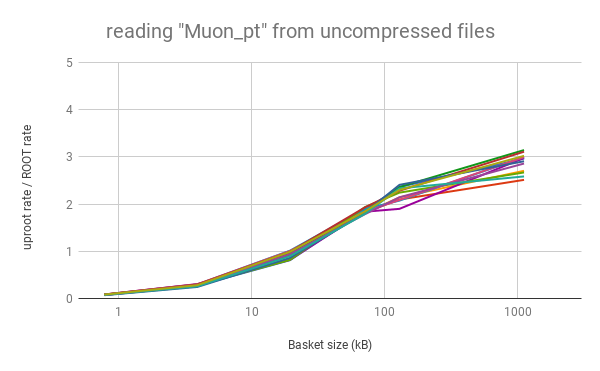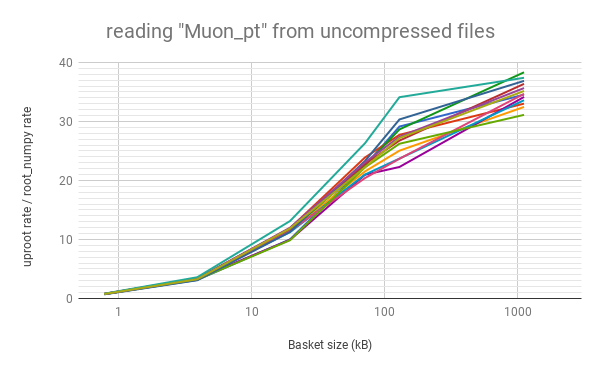ROOT I/O in pure Python and Numpy.
Project description

uproot (originally μproot, for “micro-Python ROOT”) is a reader and a writer of the ROOT file format using only Python and Numpy. Unlike the standard C++ ROOT implementation, uproot is only an I/O library, primarily intended to stream data into machine learning libraries in Python. Unlike PyROOT and root_numpy, uproot does not depend on C++ ROOT. Instead, it uses Numpy to cast blocks of data from the ROOT file as Numpy arrays.
Python does not necessarily mean slow. As long as the data blocks (“baskets”) are large, this “array at a time” approach can even be faster than “event at a time” C++. Below, the rate of reading data into arrays with uproot is shown to be faster than C++ ROOT (left) and root_numpy (right), as long as the baskets are tens of kilobytes or larger (for a variable number of muons per event in an ensemble of different physics samples; higher is better).


uproot is not maintained by the ROOT project team, so post bug reports here as GitHub issues, not on a ROOT forum. Thanks!
Installation
Install uproot like any other Python package:
pip install uproot # maybe with sudo or --user, or in virtualenvor install with conda:
conda config --add channels conda-forge # if you haven't added conda-forge already
conda install uprootThe pip installer automatically installs strict dependencies; the conda installer also installs optional dependencies (except for Pandas).
Strict dependencies:
numpy (1.13.1+)
awkward-array (0.12.0+)
uproot-methods (0.7.0+)
Optional dependencies:
lz4 to read/write lz4-compressed ROOT files
xxhash to write lz4-compressed ROOT files
lzma to read/write lzma-compressed ROOT files in Python 2
xrootd to access remote files through XRootD
requests to access remote files through HTTP
pandas to fill Pandas DataFrames instead of Numpy arrays
Reminder: you do not need C++ ROOT to run uproot.
Tutorial
See the project homepage for a tutorial.
Run that tutorial on Binder.
Tutorial contents:
Reference documentation
Project details
Release history Release notifications | RSS feed
Download files
Download the file for your platform. If you're not sure which to choose, learn more about installing packages.
Source Distribution
Built Distribution
File details
Details for the file uproot-3.8.0.tar.gz.
File metadata
- Download URL: uproot-3.8.0.tar.gz
- Upload date:
- Size: 27.2 MB
- Tags: Source
- Uploaded using Trusted Publishing? No
- Uploaded via: twine/1.13.0 pkginfo/1.5.0.1 requests/2.22.0 setuptools/41.0.1 requests-toolbelt/0.9.1 tqdm/4.32.2 CPython/3.7.3
File hashes
| Algorithm | Hash digest | |
|---|---|---|
| SHA256 | fc22306022685521fe23f0a0f0954810820826b74c25c491bca9b45aaaa7401b |
|
| MD5 | 316bba5c22235bf3f86f04faaed05ba4 |
|
| BLAKE2b-256 | bd5ae557f8b57ef80df0f8de549841059b85edea447ab99d63089f8d1c54d1aa |
File details
Details for the file uproot-3.8.0-py2.py3-none-any.whl.
File metadata
- Download URL: uproot-3.8.0-py2.py3-none-any.whl
- Upload date:
- Size: 102.9 kB
- Tags: Python 2, Python 3
- Uploaded using Trusted Publishing? No
- Uploaded via: twine/1.13.0 pkginfo/1.5.0.1 requests/2.22.0 setuptools/41.0.1 requests-toolbelt/0.9.1 tqdm/4.32.2 CPython/3.7.3
File hashes
| Algorithm | Hash digest | |
|---|---|---|
| SHA256 | eed808a53f9f521cdaa8f138b62b43648fc193daff2a04481338a554f7024979 |
|
| MD5 | aad9ad8643148f299e427541890df62c |
|
| BLAKE2b-256 | 3308935ff96e3766006b81f3499fa1da76fb4f93312cb6118d4c9aefe9a54d58 |












